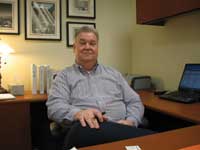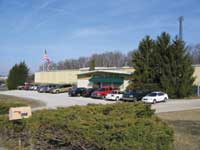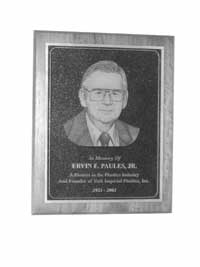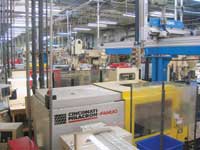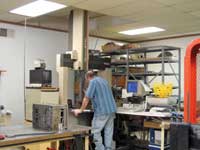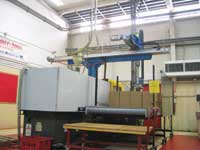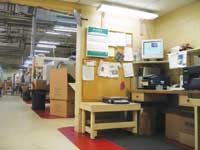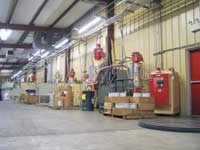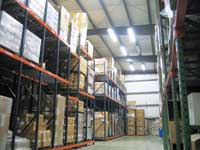Plant Tour: More than meets the eye
A custom molding operation that’s more than two decades old has assembled the ways and means it believes it needs to transform itself into a lean, green, fully automated contract manufacturing machine.
May 1, 2008
A custom molding operation that’s more than two decades old has assembled the ways and means it believes it needs to transform itself into a lean, green, fully automated contract manufacturing machine.
|
At the thought-provoking “Best Practices” panel discussion during the Molding 2008 conference sessions in San Francisco, CA back in February, panel member Bob Holbrook delivered the goods on practices like the one quoted above that he thinks small to midsize U.S. custom molders should use to best the competition.
Holbrook strongly recommended that such molders should have a strategic plan in place for growth, monitor their progress, and learn to work on their plan on an ongoing basis to adapt to changing conditions.
In other words, when the need arises, you must be willing and able to transform.
“There’s no magic answer for the Asian sourcing question,” he says. “We’ve got to work hard, stay on top of the technology, and do everything we can to be as competitive as we can be by providing excellent customer service and quality.”
Holbrook is the president of a company called York Imperial Plastics Inc. (York, PA). “We’re expecting 10-15% growth,” he said at Molding 2008. “We strive for sustainable growth without incurring any debt, if possible—10-12% growth is the norm.”
We asked Holbrook if we could come to see York Imperial’s strategic plan in action ourselves. And we also asked him if we could bring a few friends along. He surprised us, saying, “Sure,” so let’s tour.
Surprises
As we await him in the modern-looking lobby of York Imperial’s home on 718 Country Road, a factory flanked by tall trees, nestling in the countryside, we notice a bronzed plaque commemorating the company’s cofounder, Ervin E. Paules Jr. (1921-2002). “He was a 30-year molding industry expert,” Holbrook says, greeting us. “Ervin started York Imperial Plastics in 1985. His son, Dennis Paules, our CEO, owns the company now with his sister.
“South central Pennsylvania is a hotbed of injection molding. We’ve got a lot of 20+-year associates in our business today,” he adds, escorting us to the conference room.
A 25-year industry vet himself, Holbrook is the company’s president. He also oversees strategic planning and marketing for the company, and provides administrative support to all the company’s departments.
|
Holbrook also sits on the board of Mid-America Plastics Partners Inc. (MAPP; Indianapolis, IN), a growing collective that cooperatively helps its members sharpen their competitive edge. We ask him about the origin of the company’s name.
“It’s named for York Imperial apples. As a matter of fact, the company has York Imperial apple trees on its property,” he says.
That’s when we notice how new the conference room looks—just like the lobby. There’s obviously more going on here than meets the eye.
Asking if, like the lobby, the conference room’s been redone, Holbrook says it has. “It’s all part of our transformation. Just three years ago we were strictly a shoot-and-ship shop doing high-volume runs. Our focus now is on value-add work—contract manufacturing—which has required the establishment of certain new disciplines and systems, such as vibrational and ultrasonic welding, specialty packaging, and even insert molding.
“In my opinion,” he continues, “contract manufacturing takes the injection molding process all the way from the raw pellet to a custom delivery system.”
Lean manufacturing also is an essential factor in the company’s evolutionary change. “We pride ourselves on our lean manufacturing practices,” says Holbrook. “The average molding plant may have four employees per machine. Here, we average just two employees per machine. Dennis’s vision is for us to further develop our contract manufacturing services and to be as fully automated as we are lean.”
Error-proofing production
Custom to contract
After stopping at the company’s quality lab on our way to the shop floor, Holbrook points to a computer station and describes an interesting process York Imperial uses in its management reviews. “We scan parts into inventory daily, per shift. We also use this system to check that our part weight counts are verified, pictorially and by part number.”
Such procedures are part of a preventive and corrective action process, in which production and quality data analyses are used in management reviews to help implement preventive actions, so York Imperial can provide customers with the best products at the lowest costs.
It also uses this process to help solve the root causes of any part problems identified. Such procedures help York Imperial not only improve its own business practices, but also help its customers in improving their own processes.
|
“During Advanced Quality Planning sessions, we ask, ‘How will the part be used?’ We ask our customers this question so everyone understands the part’s requirement—so everyone’s on the same page,” he says. “These programs help both our customers and our company to achieve higher market share.”
ISO 9001-2000-approved, York Imperial uses the AIAG format for many customers, and also offers PPAP—including Gage R&R studies, capability studies, and Process Failure Mode and Effect Analysis services—to its automotive clientele. Its engineering systems include seats of Cadkey and SolidWorks.
Guaranteed tools
On our way out to the shop, passing its well-equipped toolroom, we ask if the company builds its own molds. “No,” he says, “but we have two full-time toolmakers and one part-timer in-house. We have engaged in strategic partnerships with moldmakers and can provide both domestic and offshore sourcing to our customers. Regardless of where they’re sourced, we guarantee our molds for the life of the program and manage the entire process. We control the entire tool build to ensure quality, operational efficiency, and reliable productivity.”
He adds that the company has provided some rather specialized tooling, including thin-wall, internal and external threading, and mechanical, hydraulic, and servodriven collapsible cores.
When we arrive at the shop floor, Holbrook notices our quizzical expression. The floor looks a bit worn. “Our floors are being redone this year to reflect the company’s new attitude,” he says hastily.
Every molding machine in the shop is equipped with a parts-removal robot. York Imperial apparently has largely standardized on Sterltech Inc.’s Sytrama four-axis servo robots. “We are impressed with their design and with the way the belt indexes upward, facilitating our preferred parts packaging technique. We recently purchased four more. The robots are programmed to separate parts for cavity-by-cavity packaging . . . see?”
Looking up, we spot one. It’s running on an all-electric—a Milacron-Fanuc all-electric.
|
Electro-molding
OK, when we first came onto the floor we spotted quite a number of different makes of machines—Van Dorn, Newbury, Cincinnati Milacron, and HPM hydraulics. We even saw a Cincinnati Elektra. But when we spot the Fanucs, Holbrook answers our unasked question. “Yes. We’ve begun to standardize on all-electrics—Fanucs. We’ll no longer have to worry about oil leaks or oil viscosity changes. All-electrics have fewer mechanical components, and they’re precise, quiet, and provide SPC control over all of the machine parameters.”
He says they also fit in perfectly with the company’s dedication to in-cycle automation, which includes automated part count controlled by either the robot or the molding machine, automated cavity separation, and full box indexing. All of its robots’ end-of-arm tooling is designed and built in-house, by the way.
In one cell running an eight-cavity tool, parts are removed, positioned over tubes, and released for cavity-specific packaging. In another cell running a 64-cavity mold, the parts are automatically counted out, dropped into tubes, and discretely deposited—100 at a time—into bags that are heat-sealed, barcoded, and stacked. Low-speed, press-side granulators are evident.
On the other side of the shop floor’s bulkhead is York Imperial’s automated material handling system. Complete with a central chiller and tower system with additional water temperature controls, there are machine-dedicated, dewpoint-monitored dehumidifying dryers and automatically controlled loaders. Most of the equipment is from Thoreson-McCosh.
Masterful molders
The company’s 10,000-ft2 parts warehouse with flow-through racking for first-in/first-out inventory control is also back here. On our way out, passing the company’s compact lunchroom, Holbrook says York Imperial is assisted in its ongoing lean training, strategic planning, and sales and marketing activities by its York, PA neighbor, Mantec Inc.
Mantec is an affiliate of the Manufacturing Extension Partnership run by the U.S. Commerce Dept.’s National Institute of Standards & Technology. York Imperial also is a devoted practitioner of manufacturing principles promoted by RJG Inc., especially those involving decoupled and scientific molding, and executive training. Currently, it has three RJG Master Molders on staff.
“Activities like these are key to our becoming a 21st century blend of a shoot-and-ship molder with a contract manufacturer. By automating even short-run jobs and by using technologies like automated cavity separation, we can be globally competitive. Also, the sharing and networking we’re involved with through organizations like MAPP help us to improve our competitiveness. Overall, we’re pretty optimistic.”
Vital Stats |
About the Author(s)
You May Also Like
